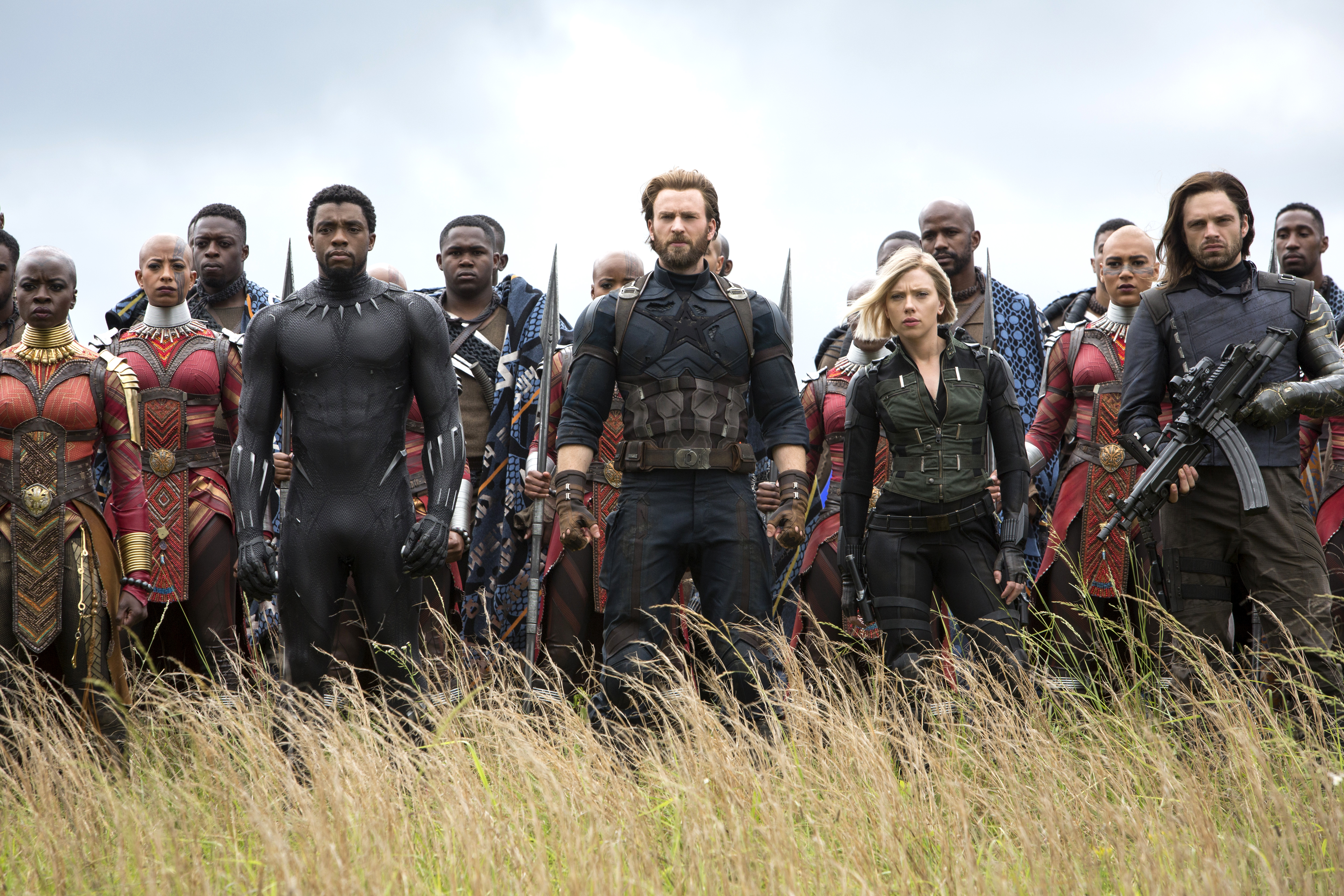Is this really the end of the Avengers?
On the infinite finale that is Avengers: Infinity War


A free daily email with the biggest news stories of the day – and the best features from TheWeek.com
You are now subscribed
Your newsletter sign-up was successful
Is this really the end? Avengers: Infinity War, released Friday, is the third Avengers movie, the eighth movie to star or co-star Iron Man, and the 19th movie set in the Marvel Cinematic Universe. It is also being promoted, if somewhat indirectly, as a finale of sorts for the popular franchise. But what kind of finale it is remains uncertain.
In the most immediate sense, Infinity War is no finale at all. An untitled fourth Avengers movie is already dated for next May (and two other MCU movies, set before the events of Infinity War, will follow in the meantime). But by bringing together most of the original cinematic Avengers (Iron Man, Captain America, Thor, the Hulk, Black Widow), later additions to the team (Scarlet Witch, Vision, Falcon, War Machine), and other solo artists (Black Panther, Doctor Strange, Spider-Man), alongside the entirely separate Guardians of the Galaxy to stand against intergalactic genocide proponent Thanos (Josh Brolin), Marvel clearly intends to bring matters to a head.
It's difficult to discuss how things come to a head without heading into spoiler territory. Yet the broad outlines of Infinity War are easy enough to communicate: Thanos is collecting cosmic "infinity stones" (yielding power over time, reality, souls, and so on) that, gathered together on his fancy gauntlet, will give him ultimate dominion over the entire universe. He is doing this because he thinks killing half of said universe will ease the burden of overpopulation.
The Week
Escape your echo chamber. Get the facts behind the news, plus analysis from multiple perspectives.

Sign up for The Week's Free Newsletters
From our morning news briefing to a weekly Good News Newsletter, get the best of The Week delivered directly to your inbox.
From our morning news briefing to a weekly Good News Newsletter, get the best of The Week delivered directly to your inbox.
Thanos is a despotic madman, but he may have a point about overpopulation, at least as far as this cinematic universe goes. There are a lot of characters in the MCU, at various stages of their on-screen development. That's one of the serial's great strengths: a deep bench of likable and lovable characters, all played by charming and capable actors, jockeying for screen time. It's a challenge that past Avengers and Avengers-related movies have risen to meet. But as this mega-series rushes to some kind of conclusion, bringing a bunch of sub-series along with it, the MCU team's balancing act, choreographed here by directors Joe and Anthony Russo and screenwriters Christopher Markus and Stephen McFeely, has become a little wobbly.
If the goal is to move at least some of these characters toward closure, Infinity War rushes across the field haphazardly, even at a luxurious 160 minutes. Iron Man (Robert Downey Jr.) feels like he's entering his third or fourth MCU coda by now, having reached a satisfying endpoint five years ago in Iron Man 3. Captain America (Chris Evans), a rich character in his own trilogy, returns to the fray without much to do, though he has more lines than the similarly compelling Black Widow (Scarlett Johansson). Some newer characters enter this all-star rumble with room still to grow. Spider-Man (Tom Holland) remains earnestly delightful, and Chris Hemsworth's alien-god Thor makes a progression from where he was left in Thor: Ragnarok. Splitting the difference between the goofiness of Ragnarok and the soap opera of earlier Thor movies, he turns out to be a great foil for various Guardians of the Galaxy.
The fun of seeing Thor banter with Rocket Raccoon and Drax doesn't offer much in the way of closure, though. Indeed, the movie's pleasures are found less from any potential finality and more in perpetuation: how the heroes hastily split up and re-combine into new mini-teams in a frantic, interplanetary attempt to stop Thanos. In the moment, that's not a problem — and wouldn't be a problem at all if Infinity War didn't nonetheless insist that this is an "end game," as Doctor Strange calls it at one point.
This portent could be out of a desire to shake up the universe, account for some soon-to-expire actor contracts, or in reaction to the criticism that MCU movies lack real stakes and sometimes feels like an endless succession of origin stories. Most likely it's a combination of all of that. Regardless, the years in origin mode may have left the Russos and their screenwriters ill-equipped to deal with the tricky, ambitious business of wrapping up. Despite some long-promised major character deaths and epic clashes, loose ends dangle carelessly throughout Infinity War. Consider a running mini-subplot about the Hulk and his alter ego Bruce Banner (Mark Ruffalo) that feels like an extended (yet weirdly under-explained) set-up for a payoff that never happens. Is this an intentional subversion of expectations? A semi-permanent change to the character? Or a running gag whose big laugh has simply been deferred another year?
A free daily email with the biggest news stories of the day – and the best features from TheWeek.com
That feeling of deferment creeps in as the movie rockets along. It's entertaining, with plenty of great lines and cool moments, but the promise of the end hasn't made the material automatically weightier, and you get the feeling that maybe the filmmakers assumed it would. Even if this gets a pass as only the beginning of the end, Infinity War is still pretty thin, not least because it barely has a proper ending of its own. Instead, it has a sequel tease disguised as a bold defiance of expectations.
The entire MCU project, connecting a variety of superhero film series into one narrative whole, has sometimes been described as big-screen TV — and at the end of the day, this might be the best way to think of Infinity War. Despite the fact that the movie is clearly part one of two, it does also manage to feel like an unwieldy series finale for a show that's been on the air for a decade-plus — if not in satisfaction than in its confident bloat. The movie has a lot of ground to cover, a lot of time to cover it, and still runs out the clock before finishing even an imitation of a satisfying standalone story.
Maybe this really is a new hybrid of movies and TV: A series finale split in half infinitely, forever working up to a new cataclysmic climax.
Jesse Hassenger's film and culture criticism has appeared in The Onion's A.V. Club, Brooklyn Magazine, and Men's Journal online, among others. He lives in Brooklyn, where he also writes fiction, edits textbooks, and helps run SportsAlcohol.com, a pop culture blog and podcast.
-
 6 exquisite homes with vast acreage
6 exquisite homes with vast acreageFeature Featuring an off-the-grid contemporary home in New Mexico and lakefront farmhouse in Massachusetts
-
 Film reviews: ‘Wuthering Heights,’ ‘Good Luck, Have Fun, Don’t Die,’ and ‘Sirat’
Film reviews: ‘Wuthering Heights,’ ‘Good Luck, Have Fun, Don’t Die,’ and ‘Sirat’Feature An inconvenient love torments a would-be couple, a gonzo time traveler seeks to save humanity from AI, and a father’s desperate search goes deeply sideways
-
 Political cartoons for February 16
Political cartoons for February 16Cartoons Monday’s political cartoons include President's Day, a valentine from the Epstein files, and more
-
 Walter Isaacson's 'Elon Musk' can 'scarcely contain its subject'
Walter Isaacson's 'Elon Musk' can 'scarcely contain its subject'The latest biography on the elusive tech mogul is causing a stir among critics
-
 Welcome to the new TheWeek.com!
Welcome to the new TheWeek.com!The Explainer Please allow us to reintroduce ourselves
-
 The Oscars finale was a heartless disaster
The Oscars finale was a heartless disasterThe Explainer A calculated attempt at emotional manipulation goes very wrong
-
 Most awkward awards show ever?
Most awkward awards show ever?The Explainer The best, worst, and most shocking moments from a chaotic Golden Globes
-
 The possible silver lining to the Warner Bros. deal
The possible silver lining to the Warner Bros. dealThe Explainer Could what's terrible for theaters be good for creators?
-
 Jeffrey Wright is the new 'narrator voice'
Jeffrey Wright is the new 'narrator voice'The Explainer Move over, Sam Elliott and Morgan Freeman
-
 This week's literary events are the biggest award shows of 2020
This week's literary events are the biggest award shows of 2020feature So long, Oscar. Hello, Booker.
-
 What She Dies Tomorrow can teach us about our unshakable obsession with mortality
What She Dies Tomorrow can teach us about our unshakable obsession with mortalityThe Explainer This film isn't about the pandemic. But it can help viewers confront their fears about death.
